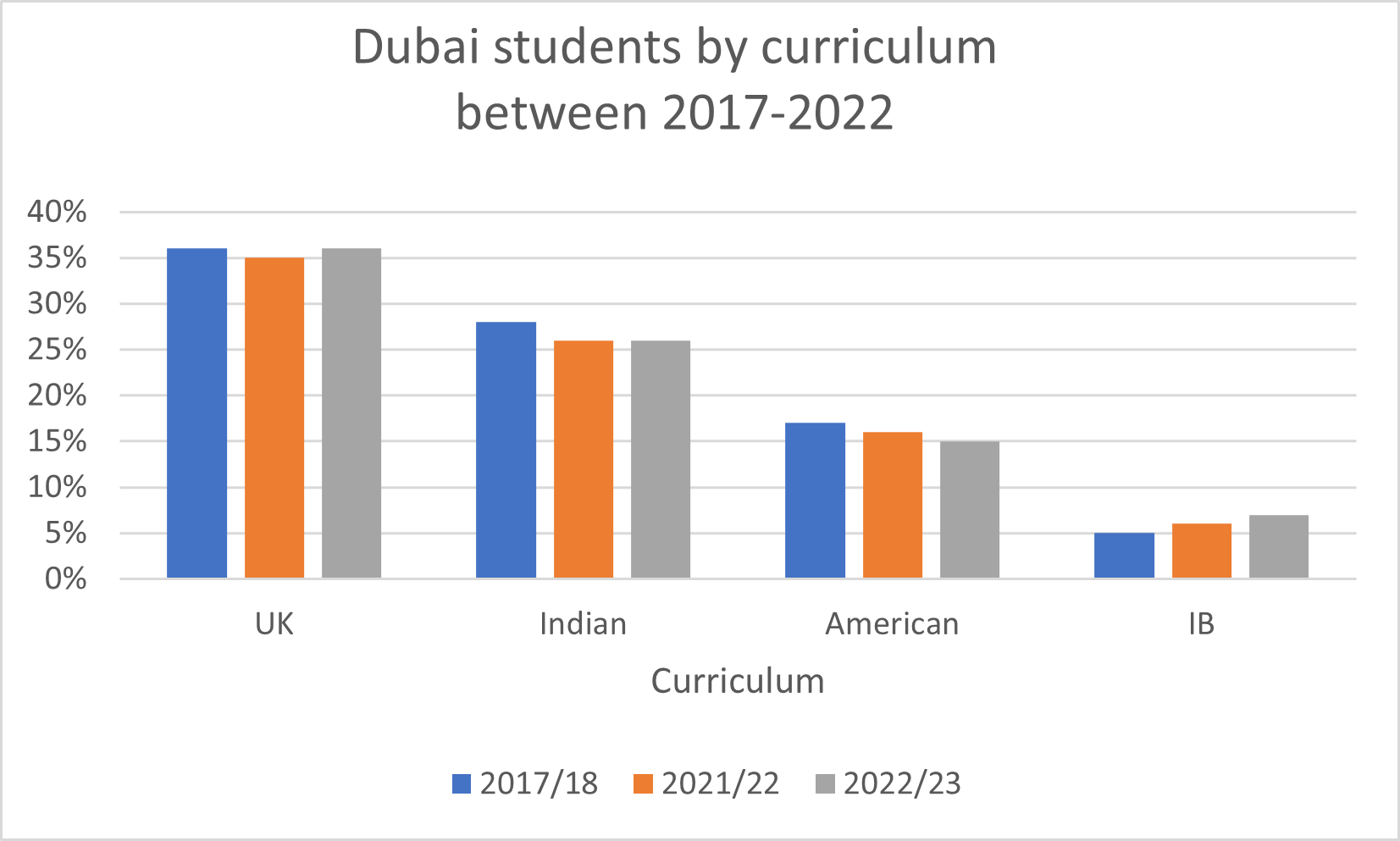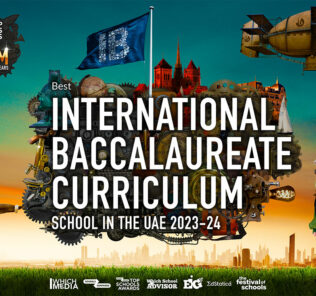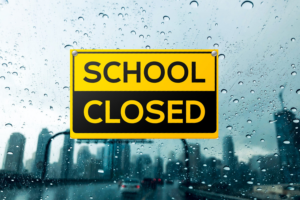KHDA Data: IB Schools in Dubai on the Rise, But Growth Slows for Other Curricula
KHDA data reveals that the International Baccalaureate (IB) is the only international curriculum that has steadily grown in the emirate over the past five years, while the other major international curricula have either declined or remained the same.
Recently released data from the Knowledge and Human Development Authority (KHDA) shows that there have been some shifts in the percentage of students studying different curricula in Dubai between 2017/18 to 2022/23.
The number of IB schools in Dubai has skyrocketed by 54% in the last five years, while UK, US and Indian-curriculum schools have either had much slower growth or declined in number.
The percentage of children attending IB schools in Dubai has also seen a steady rise, while the proportion studying other curricula has either stayed the same or decreased.
Could this be a sign of things to come? Or is it a minor, temporary shift that we should be wary of reading too much into? We spoke to Alessandro Capozzi, Head of Sixth Form at online school Kings InterHigh, Mark Atkins, Principal of British school Durham School Dubai, and Ian Thurston, Principal of IB-school Dubai International Academy, Al Barsha, for their views.
Do you want to learn more about the IB? GEMS Education is holding a free event on 23 Ferbruary 2023: The IB Uncovered: Is IB the right choice for your child? At GEMS World Academy, Thursday 23 February, 5.30pm – 7.30pm. There are still limited spaces left: sign up now.
Curriculum trends in Dubai
According to analysis of the latest data from the KHDA, which regulates Dubai schools, the International Baccalaureate (IB) is a steadily growing newcomer to the UAE’s education landscape, gaining ground in terms of percentage of students studying it, while the three mainstream international curricula – hailing from the UK, US and Indian – have either maintained their position, or seen a small decline.
Dubai curriculum trends between 2017/18 and 2022/23
Over the past five Dubai schools have seen:
- a small increase in the percentage of students studying the IB curriculum in Dubai (from 5% to 7%)
- a small decrease and plateau in those studying the British curriculum (from 36% in 2018, down to 35% in 2021, then a return to 36% in 2022)
- a small decrease in those studying the Indian curriculum (from 27% to 26%)
- a similar decrease in those studying the US curriculum (from 17% down to 15%)
- and a relatively significant rise in the percentage of students studying “other” curricula (from 8% in 2018 to 12% in 2022).
Percentage of Dubai Students by Curriculum
| Curriculum | 2017/18 | 2021/22 | 2022/23 |
| UK | 36% | 35% | 36% |
| Indian | 28% | 26% | 26% |
| American | 17% | 16% | 15% |
| IB | 5% | 6% | 7% |
| MOE | 4% | 4% | 4% |
The number of schools dedicated to the IB curriculum alone in Dubai has increased by a significant 54% (from 11 to 17) between the academic year 2017/18 and the academic year 2022/23. This figure shoots up to an increase of 127% if you also include the growth of new blended-curriculum IB/ UK and IB/US schools.
In the same timeframe, the number of UK schools has increased by a modest 1.3% (from 79 UK-curriculum schools in 2018 to 80 in 2022/23).
Meanwhile, the number of Indian-curriculum schools has decreased between 2017/18 and 2022/23, dropping from 34 down to 32 schools.
American schools paint a more complex picture: in the past five years the number of US-curriculum schools has increased quite significantly: from 34 schools in 2018 to 40 schools in 2022/23. However, the proportion of Dubai students served by US-curriculum schools has concurrently decreased, descending from 17% in 2018, to 15% in 2022/23.

Curriculum trends in Dubai between 2017/18 to 2022/23. The IB sees a steady growth, while the other major curricula have fluctuated or decreased. Based on data from the KHDA.
Why is the IB curriculum popular with Dubai parents?
So why is the IB curricula appearing to flourish in Dubai while other curricula are not seeing the same growth?
First it’s necessary to note that, in the grand scheme of things, the IB is still very much a minority curriculum when compared with the popularity of the UK, Indian and US curricula.
The International Baccalaureate (IB) is also slightly different in that it is both a framework and a curriculum, with an educational philosophy and guiding principles that can be applied to and blended with other curricula.
Alessandro Capozzi, Head of Sixth Form at Kings InterHigh – which was the first online school to offer a fully virtual International Baccalaureate Diploma Programme (IBDP) this academic year 2022/23 – explains:
“Nearly 2 million students study the IB course already and that figure is growing!
“I think students and families are attracted to the Diploma Programme in particular because of the richness of the curriculum, the breadth of subjects offered and, importantly, the focus on the development of the whole student as a thinker and global citizen.”
“It is more than the study of subjects, however — students are enabled to become more internationally minded and more collaborative, and develop a spirit of inquiry that prepares them so well for the next stage of their lives.”
Ian Thurston, Principal of IB-curriculum school Dubai International Academy, Al Barsha agrees, adding:
“The IB has seen rapid growth globally, doubling from 2,000 IB World schools in 2008 to 4,000 schools by 2014, so its growth in Dubai is to be expected.”
“I think the IB curriculum strength lies in its breadth of academic subjects and its suitability for the 21st century, combining rigorous content knowledge with real-world application, whilst developing a range of transferable skills built around morals and ethics where students strive to make the world a better place for others.”
“Universities around the world have long seen the IB as the best preparation and I think parents are increasingly recognising this as well. Its varied assessment processes certainly helped IB schools and students maintain integrity through the COVID pandemic.”
However, Mark Atkins, Principal of Durham School Dubai warns that the IB is not right for every child, and we should be wary of reading too much into minor shifts in recent data trends:
“We should not read too much into the minor shift away from Indian, US and British curricula towards IB.”
“In an international environment such as Dubai where parents generally are more aware and in tune with an international perspective, it is understandable that a curriculum with an ‘international’ title should, at first, appear more appealing.”
“Without research one might expect that the IB offers an easier pathway into universities across the globe rather than say, the Indian or British curriculum; this is not true.”
“It is possible that some parents also consider IB somehow higher status, a badge of honour with more thought to their conversations at a dinner parties than the travails of their struggling offspring; but bright children study CISCE and A Levels too and both awards are equally valid.”
“This is not to say that the IBO is not an excellent award; its breadth of study is ideal for some children. But it is certainly not right for all.”
“The only way through the IB Diploma is through sheer hard work and the price of the IB ‘breadth’ is hours and hours of compulsory study in subjects that may hold little or no interest to the candidate.”
Mr Atkins draws on his own personal experience to illustrate why the IB programmes do not serve every type of student:
“As a case in point, after IGCSEs I moved my son from an IB school to an A Level School so that he could concentrate on A Levels that interested him and prepared him for his chosen career. I have no doubt that this was the right move as it led to good A Level results rather than a mediocre IB score and two years of pain.”
Durham School Dubai’s Atkins highlights how the focused depth of A-Levels can be a real advantage for many children, even if it is at the expense of the breadth of subjects afforded by IB schools in Dubai:
“The advantage of A-levels is that candidates are free to choose any combination of subjects. For example, if a candidate wants to take all science subjects they can. True this can result in a fairly narrow curriculum, but if a student is determined to be a doctor, then why not?
“On the other hand, the way the IB is organised means that candidates are not able choose any combination of subjects they like but must take one subject from each of the first five groups; not suitable if there is one group of subjects that a candidate wants to focus on (or avoid!).”
“At the end of the day, parents must choose the course that is best suited to their child and this requires careful thought and an honest assessment of your child’s capability.”
“For certain, there is no advantage to choosing one award or another, both leave students in the same place with the same process to follow to gain admission to the universities of their choice wherever in the world they wish to study.”
“At the moment IB is gaining ground in popularity, but I believe this will not last.”
Find the latest list of the Best IB Schools in Dubai and the UAE here.
Are IB schools in Dubai a threat to the popularity of the British curriculum?
Despite how international Dubai is in terms of both culture and nationalities, the British curriculum is still by far the most dominant curriculum in the emirate, studied by more than a third (36%) of all Dubai students, followed by 25% studying Indian, 15% studying American, and 7% studying IB. Could the IB’s steadily growing popularity signal a changing tide?
Dubai International Academy’s Ian Thurston shares his thoughts:
“Most parents will know their own national curriculum when they first arrive in Dubai but perhaps not much else. As Dubai is fairly transient, people are often thinking about curricula that will be recognised in other countries as they may move on in the near future. The British curriculum has a longstanding reputation of being a high-quality product and has been an excellent export for the country for decades; parents will often favour the ‘tried and tested’ approach to their children’s education.”
“However, as curricula like the IBDP (International Baccalaureate Diploma programme, taken at post-16) and IBCP (International Baccalaureate Career Programme, a more vocational alternative to the IBDP) become more mainstream, parents can see success stories of students who have progressed into top universities or been successful in their own business, I wouldn’t be surprised to see the recent trend towards the IB or other curricula continue.”
Kings InterHigh’s Alessandro Capozzi – which predominantly offers the UK curriculum – says that their decision to introduce the IBDP into their online school was due to demand from parents, as well as the fact that its international and broad nature often gels well with the open-minded, flexible approach and ethos of students who have chosen a home-schooling or online-school option:
“We are very particular about what we offer our students — it has to open doors, it has to be accessible, and it has to be of the highest quality. The IBDP was exactly that. Being able to offer a world renowned, highly in-demand curriculum was a huge motivation for us.”
“But more than that, we saw the opportunities the programme afforded for students to collaborate, learn from peers across the globe, and develop as individuals beyond the computer screen, particularly through aspects of the programme like the ‘Theory of Knowledge’ and ‘CAS’: Creativity, Activity, Service.”
“We get a lot of feedback that the IB is a deeply interesting and enjoyable curriculum. We also frequently hear that IBDP students are amongst those best prepared for university study due to the broader, more holistic education they have received.”
“Take-up has been brilliant. We have scores of students studying the DP online from all over — not just in Europe, but in the UAE and even further afield. It has been wonderful to see students from such a range of cultures and countries share, learn, and thrive together.”
In contrast to the steady growth of the IB curriculum globally, the British curriculum has received criticism recently for a number of factors – including being outdated, too narrow and too focused on assessment. Read some of the criticisms against the British curriculum here.
Durham School Dubai Principal Mark Atkins explains that this should not be taken out of context, nor overemphasised:
“I believe the English National Curriculum is good one and, if delivered by outstanding teachers in school environments where children are secure, free from fear and allowed to flourish, then I am hard pressed to think of better; there is no need for a shake-up but perhaps some thought into how it is delivered and how success is measured.”
“In recent years, there has been much debate about the value of testing children and the element of competition in schools and between schools. There is some merit in this. Learning is not a competition, it is an individual process with every child having their own pace and style of learning – learning is a journey not a destination and must be assessed as such.”
“That said, it is incumbent on every school to prepare its pupils so that they can achieve to the very best of their ability and this is especially relevant in public examinations.”
“There has to be rigour, there has to be structure and there have to be high expectations.”
“However, examinations for young children have little value and may actually be harmful. We must ask what these exams are for – for the good of the child or to allow authorities to ‘rank’ the school? Surely everything that takes place in a school should be for the children’s benefit?”
“At Durham we are working to create a school in which pupils thrive, teachers remain highly motivated and parents feel involved and informed. Our classroom environment is one where children feel safe and one in which secure competition is encouraged. We are trying to create a school that follows the English National Curriculum but one where talented teachers allowed the freedom to teach the children what they actually need without fear of performance metrics.”
Do you want to learn more about the IB? GEMS Education is holding a free event to learn more: “The IB Uncovered: Is IB the right choice for your child?” at GEMS World Academy on Thursday 23 February, 5.30pm – 7.30pm. There are still limited spaces left: sign up now.
What do you think about the growth of the IB versus the criticism of the British curriculum? Read one argument in support of the British curriculum here and one argument for the IB here.
Find the latest list of the Best IB Schools in Dubai and the UAE here.
© SchoolsCompared.com. A WhichMedia Group publication. 2023 – 2024. All rights reserved.






























































Leave a Response